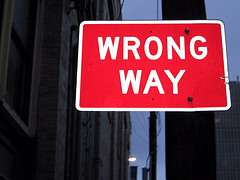This has been a very weird four days.
First, I found out that USA Weekend— the weekly newspaper supplement that appears in more than 800 newspapers in the U.S. and is read by 4.7 million people each week — published a cool, little story about Math for Grownups this weekend. “Man,” I thought. “This is great!”
Then I read the first and only (at the time) comment:
In “Benefits vs. Raise” I am surprised you made the common mistake of thinking you will make less money if you get a raise. If you move to a higher tax bracket it is only the incremental money that is taxed at the higher rate. You should print a correction.
See explanation here
Long story short: my explanation in Math for Grownups is correct. Sadly, for Gregory Connolly, the reporter who wrote this otherwise really nice story, some of the information in the article was not. In a few days the geeky little corner of the blogosphere that pays attention to these things went nuts. I’ve gotten emails, nasty tweets and more — even after I posted what I think is a very level-headed response to the original comment, letting readers know that the error was the reporter’s. And even after USA Weekend posted an excerpt from my book that explains (correctly) how math and the tax system work in this situation.*
Today, more people took notice, with a blog post on Huffington Post (USA Today Fails Math for Grownups), Daily Kos (According to USA Today’s Logic, You Should Ask Your Boss for a Pay Cut) and The Columbia Journalism Review (A More than Marginally Embarrassing Mistake).
Hoo-wee! When math, taxes and mistaken reporting collide, sparks fly!
I’m still trying to figure out if this is a good thing for me or a bad thing. (Is any publicity good publicity?) But this whole experience illustrates a few interesting points:
1. Math matters. When you think that you don’t need to understand how math applies to the tax code, think again, my sister and brother. I’ve got dozens of internet commenters and tweeters begging to convince you differently. And quite honestly, they’re not as nice as I am.
2. It’s critical to check your assumptions. I’m convinced that Mr. Connolly wouldn’t have made the same mistake had he really considered what he was writing. Yes, it’s a common mistake and even an element of misinformed political rhetoric to believe that a raise could actually be bad for a person. But really? Does that make sense? Just like with math problems, checking to see if the answer is reasonable can save anyone from a lot of heartache. (And I’m thinking this reporter has had at least some heartache this week.)
3. There’s good reason that people are scared of math — big, mean, know-it-alls shame us into believing that a simple misunderstanding or mistake will bring down entire civilizations, crush the delicate sensibilities of our dear children and bring us perilously close to either left- or right-wing political domination. In other words, if we don’t get every single syllable and number absolutely correct, we are wrong, wrong, wrong and nothing can save us from eternal shame and damnation.
(How many of you felt this way in school?)
But whether or not these internet commenters, bloggers and tweeters would like to admit it, not much about math will cause such drastic, awful consequences. Sure, there may plenty of people more than willing to shout, “YOU’RE WRONG!” rather than admit that they, too, sometimes feel like math is hard and the tax system can be difficult to comprehend. But in the end, I’m here to say that the basic math that most of us have to do everyday both matters and won’t kill you.
The fact that I’m still alive, sober and writing about this after the frenetic tongue lashing I’ve received over the last few days is testament to this. You can survive making math mistakes (or other’s math mistakes). And I honestly hope that someone is telling the poor Gregory Connolly this very thing.
So let’s fess up. What was your last math mistake? Did it cause the ground to open up and swallow up innocent puppies and kittens? Or did you just lose a little cash or miss the previews at a movie or put too much fertilizer on your lawn?
Share your math horror stories in the comments section.
*Update: USA Weekend is continuing to finesse its response to this situation. The last section of the article has now been rewritten to correct the mistake, and the excerpt from my book has been removed.
